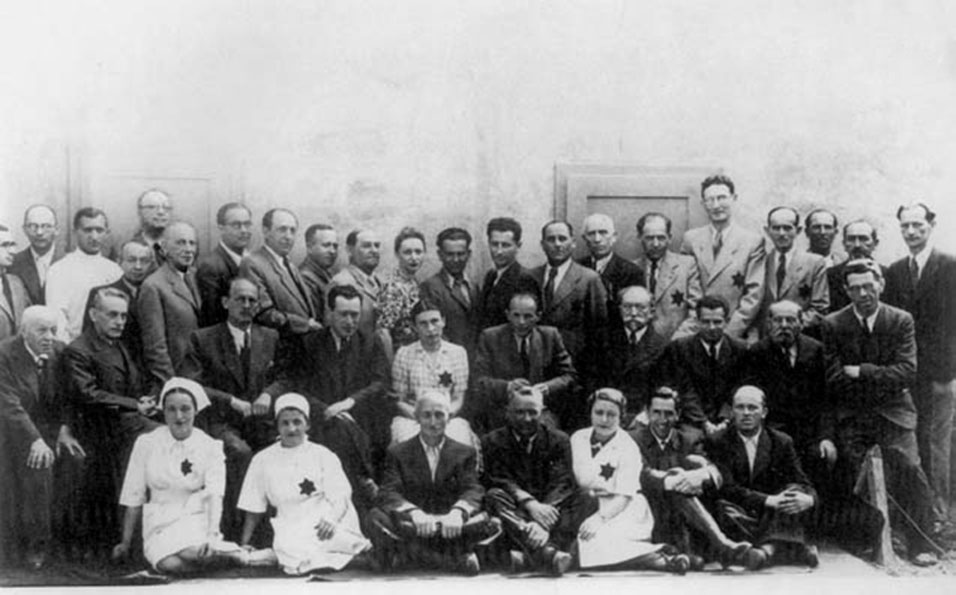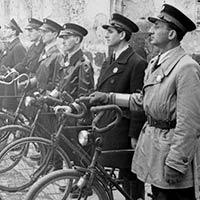Moshe (Mojżesz) Merin
Moshe (Mosheh) Merin (also Moniek Merin, Moszek or Mojżesz Israel Merin; 1905-1943) was the chairman of the Jewish Community Council, or Judenrat, in the Sosnowiec ghetto during the occupation of Poland by the Germans during World War II. He probably died in the concentration camp Auschwitz (German: Konzentrationslager Auschwitz) was a complex of over 40 concentration and extermination camps operated by Nazi Germany in occupied Poland during World War II and the Holocaust. It consisted of Auschwitz I, the main camp (Stammlager) in Oświęcim; Auschwitz II-Birkenau, a concentration and extermination camp with gas chambers and crematories; Auschwitz III-Monowitz, a labor camp for the chemical conglomerate IG Farben; and dozens of subcamps. The camps became a major site of extermination of Poles and the Nazis' Final Solution to the Jewish Question. . As was the case with most of the then leaders of the Jewish Council, his actions or lack of them during the Holocaust in occupied Poland arouse much controversy. He was described as an unstable and impulsive man. Before the war, in Sosnowiec, he had a reputation as a political fraud and a gambler.
(German: Konzentrationslager Auschwitz) was a complex of over 40 concentration and extermination camps operated by Nazi Germany in occupied Poland during World War II and the Holocaust. It consisted of Auschwitz I, the main camp (Stammlager) in Oświęcim; Auschwitz II-Birkenau, a concentration and extermination camp with gas chambers and crematories; Auschwitz III-Monowitz, a labor camp for the chemical conglomerate IG Farben; and dozens of subcamps. The camps became a major site of extermination of Poles and the Nazis' Final Solution to the Jewish Question. . As was the case with most of the then leaders of the Jewish Council, his actions or lack of them during the Holocaust in occupied Poland arouse much controversy. He was described as an unstable and impulsive man. Before the war, in Sosnowiec, he had a reputation as a political fraud and a gambler.

In January 1940, the Nazis appointed Merin as chairman of the Central Bureau of the Jewish Council of Elders in Eastern Upper Silesia, responsible for approximately 45 Jewish communities with approximately 100,000 Polish Jews. After a year he controlled dozens of Judenrats. Merin had a negative attitude towards Jewish groups opposing the occupation. He aided the Nazis in hunting down the leaders of these groups, going so far as to file a motion for their arrest and sign their own execution orders. He did this with the full cooperation of the Jewish police German: Jüdischer Ordnungsdienst, literally Jewish Order Service, customarily Jewish police - during World War II, they ware partially subordinate to the Judenrat, collaborating with Nazi Germany, Jewish Police units operated inside ghettos, labor camps and concentration camps. The police dealt with requisitions, round-ups of other Jews, escorting displaced people and deportation actions., whose commander fervently defended Merin's every decision.
German: Jüdischer Ordnungsdienst, literally Jewish Order Service, customarily Jewish police - during World War II, they ware partially subordinate to the Judenrat, collaborating with Nazi Germany, Jewish Police units operated inside ghettos, labor camps and concentration camps. The police dealt with requisitions, round-ups of other Jews, escorting displaced people and deportation actions., whose commander fervently defended Merin's every decision.
Merin's approach was similar to that of Chaim Rumkowski because he was convinced that by forcing Jews to forced labor some of them will survive the war; this approach was rooted in the centuries-old Zionist concept of save yourself and others by becoming useful.
However, Merin became involved in extortion far beyond what other ghetto leaders would ever have undertaken. On one occasion, Merin demanded a ransom of 15,000 zlotys for each of the 100 prisoners he had promised to free from mortal slave labor. This amount was three hundred times higher than the highest similar ransom collected in the Lublin ghetto. None of the Jews were released and the money was never returned. Like Rumkowski, Merin tried to justify the surrender of the 25,000 Jews he had helped deport to the Germans, claiming that their sacrifice enabled those who remained to survive. He stated:
If I only lost 25 percent and I could have lost everyone, who can imagine better results?
Morin consistently met every German demand, was perceived by everyone as a Nazi collaborator.
Merin reorganized the composition of his Jewish Councils, expelling those who opposed his methods and appointing Jews loyal only to him, including his own brother-in-law and the notorious criminal Abraham Gancwajch, to carry out subsequent Nazi orders in and around Sosnowiec. Despite full cooperation with the Nazis, Merin was sent to Auschwitz-Birkenau in June 1943, a month before the last deportation of Jews from the Sosnowiec ghetto.